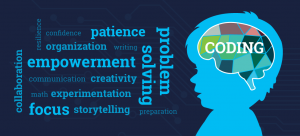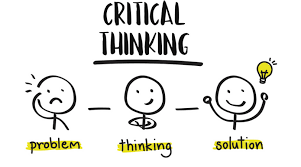The Importance of Coding for Kids in the Digital Age
BEST CAREER COUNSELLOR FOR STUDENTS IN DELHI NCR
In this blog, we will explore why coding is so important for kids, its impact on their cognitive and emotional development, and how it prepares them for the future job market.
Top career counseling for students in North Delhi: Rohini, Pitampura, and Shalimar Bagh
1. Coding as a Fundamental Skill for the Future
In the digital age, coding is becoming as fundamental as reading and writing. The world around us is increasingly driven by technology, and coding is the foundation upon which much of that technology is built. Whether it’s creating websites, apps, games, or artificial intelligence, coding is behind the scenes of almost every digital experience we encounter daily. For kids, learning to code means understanding how technology works rather than just consuming it.
The future job market will demand a wide range of tech-related skills. According to a report from the U.S. Bureau of Labor Statistics, software development and IT jobs are among the fastest-growing fields, with opportunities expected to increase by 22% over the next decade—much faster than the average for all other industries. By learning coding early, children gain a head start in acquiring the skills that will be crucial in tomorrow’s workforce.
Coding doesn’t just prepare kids for jobs in tech; it also enhances their overall career readiness. The problem-solving and critical thinking skills that coding develops are valuable in nearly every profession. From engineers to artists, healthcare professionals to business leaders, coding fosters a mindset that encourages innovation, adaptability, and efficiency—traits that will serve children well throughout their lives.
Best career counseling services in East Delhi: Laxmi Nagar, Preet Vihar, and Mayur Vihar
2. Building Problem-Solving and Critical Thinking Skills
One of the key benefits of teaching kids to code is the development of problem-solving skills. When a child learns to code, they are essentially learning how to break down complex problems into smaller, manageable parts. Coding requires kids to think logically, sequence steps, and debug errors in their programs, which mimics real-life problem-solving scenarios.
By working through challenges, children gain confidence in their ability to find solutions. They develop a growth mindset, learning that making mistakes is part of the learning process and that persistence is key to overcoming obstacles. As children tackle coding problems, they learn to approach challenges systematically, a skill that is transferable to many aspects of their lives, whether it’s math homework, learning a new language, or navigating social situations.
Coding also teaches kids to think critically. They must constantly evaluate their code and anticipate potential issues. Does the program run as expected? Is the user interface intuitive? By practicing this process, children develop a keen attention to detail and the ability to think several steps ahead—skills that will be valuable in any career.
Best career counseling services in South Delhi: Hauz Khas, Saket, and Greater Kailash
3. Fostering Creativity and Innovation
Coding is not just about logic; it’s also a highly creative process. Children who learn to code gain the ability to bring their ideas to life. Whether they’re building a game, designing an interactive website, or developing a robot, coding allows kids to create something unique and tangible. The act of coding is often compared to writing or painting—it’s a medium for self-expression and innovation.
By coding, kids learn that they can shape the digital world around them. Instead of passively consuming technology, they become active creators, thinking outside the box and imagining new possibilities. This creative freedom fosters an entrepreneurial mindset and encourages kids to explore new ways of thinking and problem-solving.
Moreover, coding provides a framework for experimenting and iterating. Kids can try out different designs, test their ideas, and modify their programs until they get the desired result. This iterative process is a valuable skill that teaches resilience, perseverance, and the importance of experimentation.
4. Coding Enhances Collaboration and Communication Skills
While coding is often thought of as a solitary activity, it can also foster collaboration and communication. Many coding projects, particularly those in the real world, require teamwork. Kids who learn coding are likely to participate in group projects, where they can collaborate with others to achieve a common goal. In these settings, children practice sharing ideas, discussing strategies, and problem-solving together.
Collaboration in coding also teaches kids the importance of listening and giving constructive feedback. In group coding sessions, children are encouraged to explain their thought processes, ask questions, and listen to their peers. This helps them develop strong communication skills, both verbal and written. They learn how to present complex ideas clearly, which is essential in every field of work, from business to medicine to education.
Additionally, as children work on collaborative coding projects, they learn the value of diverse perspectives. Coding often involves brainstorming, prototyping, and finding innovative solutions. A group of people with different experiences and viewpoints can come up with more creative ideas and solve problems more effectively than a single individual.
5. Coding Teaches Persistence and Resilience
Coding is inherently challenging. Kids will encounter bugs, errors, and setbacks as they write their code. These obstacles can be frustrating, but they also offer an excellent opportunity for children to develop persistence and resilience. When their code doesn’t work as expected, kids learn to troubleshoot, test different approaches, and think critically about what went wrong.
This process teaches them that failure is a natural part of learning and that success comes through trial and error. In today’s world, where instant gratification is often the norm, learning how to deal with failure is an essential life skill. Children who experience setbacks in coding can carry those lessons forward into other areas of their lives, understanding that challenges are opportunities for growth, not roadblocks.
6. Preparing Kids for a Tech-Centric World
In the 21st century, technology is everywhere—from smartphones to smart homes, from virtual assistants to self-driving cars. In fact, many experts believe that children born today will grow up in a world where technology is an integral part of every aspect of life. By teaching kids to code, we are preparing them to navigate and contribute to this tech-centric world.
Coding encourages children to become digital citizens—individuals who not only understand technology but can use it responsibly and creatively. As they learn coding, children also learn about issues like data privacy, cybersecurity, and the ethical implications of technology. These lessons are crucial as the digital world continues to expand and evolve.
Furthermore, coding helps kids develop a strong digital literacy foundation. In a world where information is often accessed through digital platforms, it’s important for children to understand how those platforms work. Coding provides them with a deeper understanding of the digital tools they use every day, which empowers them to make informed decisions about technology.
7. Coding as a Tool for Fun and Engagement
Learning to code can be incredibly fun. In fact, one of the reasons coding is so effective in engaging kids is that it can be gamified. Many coding platforms use game-like environments to teach kids the basics of coding, making the process enjoyable and rewarding. For example, platforms like Scratch, CodeCombat, and Tynker allow kids to create their own games or animations, fostering both creativity and coding skills.
Games are an excellent way to motivate children to keep learning. They offer a sense of accomplishment and provide a clear path of progression. As children master new coding concepts, they can level up, unlock new features, and see tangible results from their efforts. This sense of achievement makes coding feel like a fun challenge rather than a daunting task.
Moreover, coding is often linked to projects that kids are passionate about—whether it’s building their own video games, creating a blog, or designing an app. This personal connection makes coding more relevant and exciting, which increases engagement and motivation.
8. Conclusion: The Long-Term Benefits of Coding Education
The digital world is here to stay, and coding is one of the most important skills that kids can learn to navigate it. Coding offers numerous benefits, from building problem-solving and critical thinking skills to fostering creativity, collaboration, and resilience. As children learn to code, they are not just learning a technical skill; they are developing the mindset and tools they need to succeed in a fast-paced, ever-changing world.
Teaching coding to kids today is an investment in their future. It prepares them for a variety of careers, enhances their cognitive abilities, and helps them develop the adaptability they need to thrive in the digital age. In a world where technology is only becoming more central to our lives, coding is no longer a niche skill—it’s a necessary one. For parents and educators, introducing kids to coding is one of the best ways to equip them with the skills and mindset needed for success in the 21st century.











